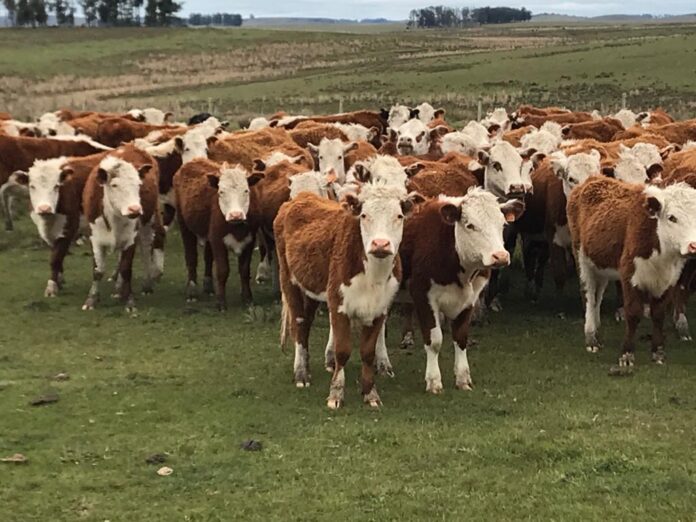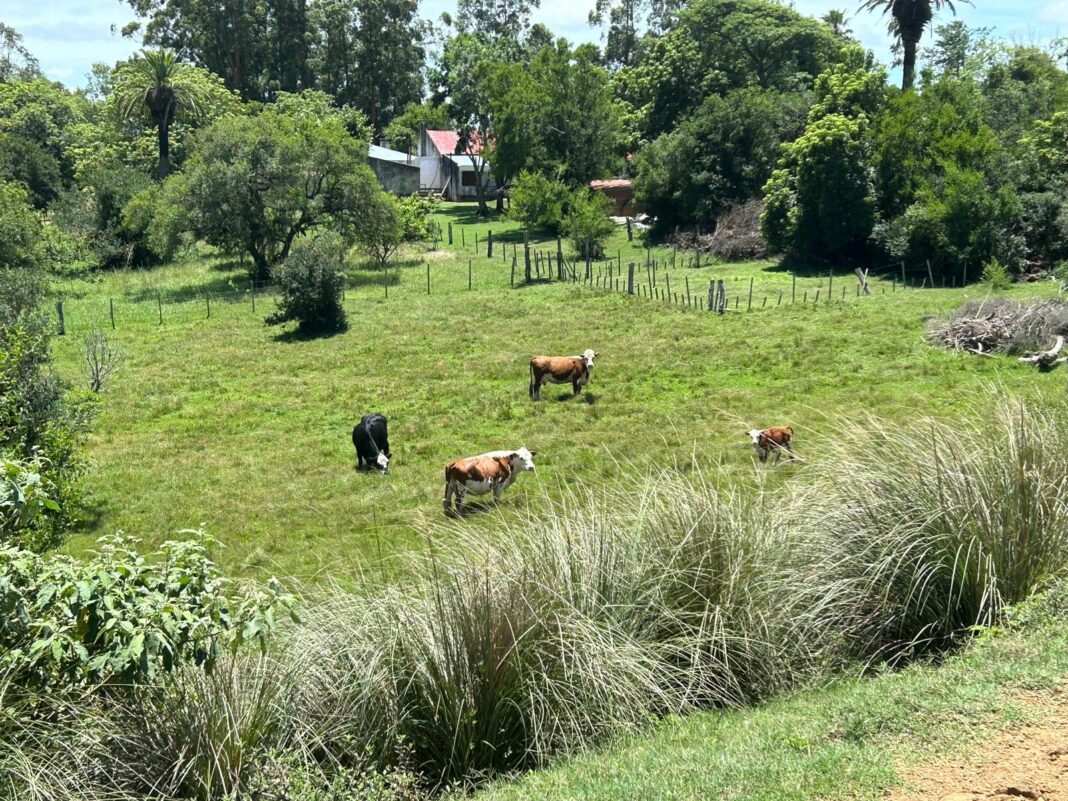By Eric van de Beek
Dutch farmers considering emigration are not thinking primarily about South America. That would possibly be different if they knew about the opportunities on the continent. Three Dutch nationals living in Uruguay are full of enthusiasm. “If you want to have a future as a farmer, you have to farm somewhere else, where you can still are enabled to act as an entrepreneur.”
Located on the west coast of the Atlantic Ocean and bordering Argentina and Brazil, Uruguay is more than four times the size of The Netherlands but has five times fewer inhabitants. One and a half million of them live in the capital Montevideo. So there’s space in abundance for the other two million. Outside the capital there are many times more cows, sheep and horses than people. Uruguay’s main export product is beef, with soy in second place. Three Dutch nationals knowledgeable about the agricultural sector praise Uruguay for its favourable business climate, level of prosperity, political and economic stability and its western culture, among other things. They think there’s no future for farmers in The Netherlands. They are forced to curb animal numbers and to cut nitrogen emissions.
Gert Jan Mulder bought a 423-hectare farm in 2002, which he transformed – in his own words – into “a paradise” and which subsequently became worth “at least 12 times more”. Mulder, a former Rabobank representative for Latin America, did not lack financial means before he started farming, but the sale of his farm to a “rich North-American” two years ago, netted the farmer’s son a capital. Now he lives in Uruguay’s Saint-Tropez, Punta del Este, in a stylish villa, a stone’s throw from the beach. Last year, Mulder’s autobiography came out, entitled Vrijwel Onbeperkt, in which he looked back at his life. But it is mainly the present that keeps him busy, especially Dutch government policy that – in his opinion – has brought the country to the brink of the abyss. Mulder likes to talk a lot about issues such as mass immigration, Islamisation, wokeness, the ever-expanding civil service, Europe’s confrontational course towards Russia, the erosion of national sovereignty – but not right now. Our topic of conversation is the opportunities for Dutch farmers in Uruguay.
“If I was still on a farm in the Netherlands, from yet another generation of my family, I would tell them to get lost,” Mulder says. “I wouldn’t let them chase me away from my land. So it’s great that those farmers are resisting. I support them. But that does not take away from the fact that in recent decades a number of trends have been set in motion that mean that a farmer in Europe, and certainly in the Netherlands, can no longer do business freely. If you want to have a future, you have to farm somewhere else, where you can still be an entrepreneur.”

Like in Uruguay. “I’ve had a farm in Uruguay for over 20 years and in that period of time I’ve been visited by officials only twice. Once they came to see if I had vaccinated the cattle against foot-and-mouth disease. And the second time some official from the capital came to ask why I didn’t participate in the census. So those two official visits in 20 years have taught me that you can do business freely here. The only thing that has been restricted in recent years is that you have to rotate your crops to keep the soil quality right. So you can’t do soya, soya, soya. How often you can grow soya or anything else depends on the quality of the soil. To grow crops, you have to submit a plan where you have to observe certain parameters. Other than that, you are just free to do business in Uruguay. But the same goes for Paraguay, Brazil and Argentina, all countries where farmers can just still be farmers.”
Mulder has mainly been involved in cattle breeding. “I crossed Hereford cows, which are red-coloured beef cattle, with Aberdeen Angus, which are black-coloured beef cattle. In some years, we had up to 300 calves born in one year. In Uruguay, this is all done outside in the wild, without a vet. The cattle can do it all very well by themselves. Gestation was done by about 15 young bulls. One bull can cover about 30 cows per season. Those calves had a wonderful time with their mothers and grew like cabbages. The first six months we let them walk and drink with the mother cow. Taking calves away immediately as it happens in dairy cattle is heartless and unhealthy for both mother and calf.”

Besides Mulder, Mattijn Heijne also has a long history in Uruguay. His marketing studies at Hogeschool ‘s Hertogenbosch brought him to the South American continent; and it was his Dutch-Uruguayan wife that took him to Uruguay, where she inherited a family farm. Heijne represents a number of European companies in Latin America and teaches international cultural diversity management at the University of Montevideo.
“Opportunities for Dutch farmers are particularly for those who are able to be more productive on a square metre,” he says. “In the field of animal husbandry for the meat industry, the Dutch could probably learn a thing or two from the Uruguayans. And also in the production of soya and maize, for example, they are planting with the most modern techniques. But in all other areas of agriculture, a Dutchman can very likely gain an advantage over local farmers.”
The west of Uruguay is characterised by agriculture and that is because it is located on one of the three largest underground freshwater basins in the world. “It therefore has very fertile soil, which is extremely suitable for arable farming and growing products such as soya, maize, wheat and malt,” says Heijne. “In that region, the dairy industry is also the strongest.” In the central and eastern parts of the country, animal husbandry for the meat industry is the most important. Most of the livestock farming is focused on the meat industry with cows and sheep often combined on an estate. Sheep are often kept to clean up the grassland. “They eat the larger tussocks in the field, so the cows can better access the lower grass,” he says.
According to Heijne land often costs up to more than US$ 10,000 per hectare. In the eastern, less fertile parts of Uruguay, the price is around US $2,500 to US$ 3,500. Lands between the two areas cost around 5,000 and 7,000. Heijne stresses: “Foreigners here have exactly the same rights as Uruguayans and the government encourages skilled immigration.”
A third Dutchman in Uruguay is Jan Meekma. He is a farmer’s son, business administrator and is brooding on a plan to set up a cooperative for Dutch farmers in his new country of residence. He ended up with Uruguay after having discarded other Latin American countries. He refrained from Brazil because its language is Portuguese; he found Spanish easier to learn. Chile and Argentina deterred him because of the strict measures the governments of these countries had taken during the corona pandemic; “they were even stricter than in the Netherlands”. For Argentina, moreover, the country is politically and economically very unstable and Chile has taken an “extreme left-wing course”. Paraguay was also a serious option for Meekma, but it ended up being Uruguay. Important reasons for him were that the country is politically stable and self-sufficient in both food and energy production. “For farmers, Uruguay is a paradise. Because you have a very even climate. The animals can walk outside all year round. There is enough rainfall and enough sunshine, which you need to get quality grass.”
Meekma explored opportunities for Dutch cheesemakers in Uruguay, but that trail reached a dead end. “There is a brand new milk powder manufacturer here, Alimentos Fray Bentos, which is only running at 30 per cent of its capacity because of insufficient milk supply. There are just too few cows delivering milk here.”
Meekma is now brooding on a plan to establish a colony in Uruguay of Dutch farmers, following the example of cooperatives set up in Brazil by the Dutch in the last century, namely Frisia, Castrolanda and Capal. With a combined annual turnover of more than US$ 5.5 billion by 2022, they are among the most successful enterprises in Brazil. In Uruguay, cooperatives enjoy significant tax advantages. Other benefits Meekma mentions of this business model include the opportunity to develop a circular agri-culture and establish a Dutch community with schools and shops. “Also, as a cooperative one enjoys a strong position, both in markets and relative to public authorities.”
Photography by Mattijn Heijne



